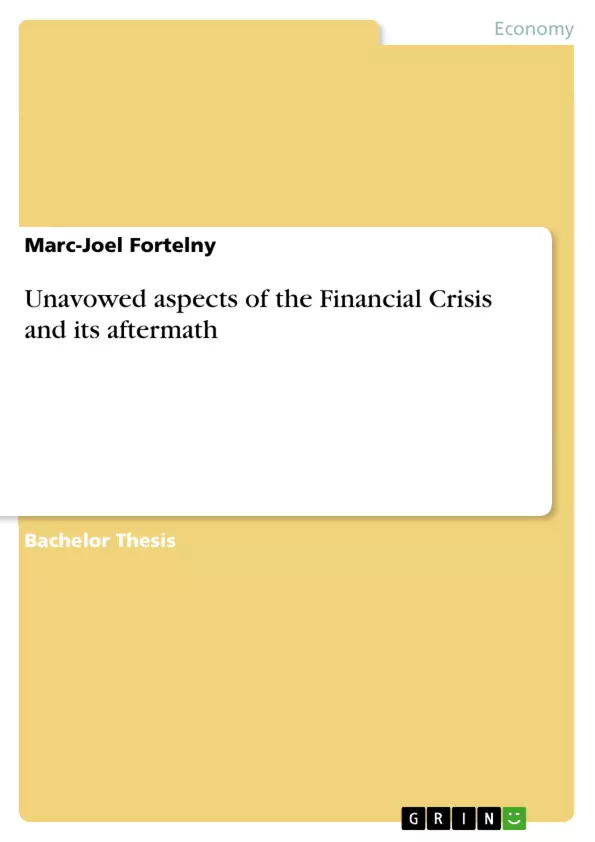Summa summarum the Financial Crisis was like a test of faith, namely this is what remains when the complex and complicated formulas of finance are decoded. The acceleration of different methods like the housing policy creation has to be taken into account due to the fact that the space for growth is still accessible – however if peaks tend to point to the limitations of the system a possible crash is immanent. The big question is when and how finiteness will be reached.
Inhaltsverzeichnis (Table of Contents)
- Foreword
- Introduction
- History in a nutshell
- Aftermath in numbers
- Pre-Analysis
- Finance Industry in raw facts
- Regulation of the Financial Markets
- Lobbying in the USA and Europe
- In-depth Analysis and Measurement
- Subprime Loans - Regulatory Failure
- The Banks shift of focus
- The U.S Dollar as a vehicle to chaos
- Fiat Money
- Zero interest policy
- Aggregation of markets, its effect on the Sharpe Ratio and portfolios
- The necessity of continuous growth through interest
- Save yourself through saving?
- Conclusions and Projections
- Collapse of the system
- Rebalancing through neutralization
- Nationalizing the Banks
- Recap
Zielsetzung und Themenschwerpunkte (Objectives and Key Themes)
This thesis aims to provide a comprehensive overview of finance markets, encompassing their structure, mechanisms, political environment, and the intricate correlations and connections within. It delves into specific aspects of the financial crisis of 2008, utilizing logical and mathematical explanations to elucidate the failing mechanisms, conditions, and resulting outcomes. The text explores the role of trust in the credit system, and the impact of a shifting focus on short-term gains over long-term sustainability.
- The role of regulatory failure and the lack of oversight in the subprime mortgage market.
- The detrimental effects of short-term profit maximization and the shift in focus by banks from customer savings to high-risk investments.
- The consequences of an artificially fixed low interest rate policy on the global financial system and the impact on trust and speculation.
- The unsustainable nature of continuous growth in a finite world, with particular emphasis on the implications of resource depletion and the limits of exponential growth.
- The inherent flaws in the fiat money system and the intricate relationship between debt creation and inflation.
Zusammenfassung der Kapitel (Chapter Summaries)
The first chapter examines the genesis of the 2008 Financial Crisis, highlighting the role of the US housing market and the interplay of various financial institutions. The chapter delves into the consequences of the crisis, analyzing the significant financial interventions implemented to mitigate the damage. The second chapter presents a pre-analysis of the financial industry, exploring its structure, regulation, and the influence of lobbying. The chapter scrutinizes the complexities of financial markets and the challenges faced by regulators in ensuring financial stability.
Chapter three delves into a detailed analysis of key aspects of the financial crisis, including the subprime mortgage market, the shift in focus by banks, and the role of the U.S. dollar. The chapter examines the consequences of artificially manipulated interest rates and the unsustainable nature of continuous growth. The fourth chapter outlines the potential collapse of the financial system, analyzing the role of exponential growth and its implications for the economy. The chapter explores the possibility of rebalancing through neutralization and the potential of nationalizing banks to address the crisis.
Schlüsselwörter (Keywords)
The key terms and concepts explored in this thesis include financial crisis, subprime mortgages, regulatory failure, bank leverage, fiat money, interest rates, continuous growth, resource depletion, nationalization, and the role of trust in the financial system. The thesis delves into the complexities of a global financial system driven by short-term profit maximization and the challenges posed by an unsustainable reliance on debt-based growth.
Frequently Asked Questions
What was the primary cause of the 2008 Financial Crisis according to this thesis?
The thesis points to regulatory failure in the subprime mortgage market, unsustainable housing policies, and a shift toward short-term profit maximization.
What is 'Fiat Money' and why is it discussed?
Fiat money is currency not backed by a physical commodity. The thesis explores how debt creation and inflation are inherent flaws in this system.
How did interest rate policies contribute to the chaos?
Artificially low interest rate policies encouraged excessive speculation and debt, undermining trust in the global financial system.
What are the 'unavowed aspects' mentioned in the title?
These include the systemic necessity of continuous growth in a finite world and the often-ignored limits of exponential growth and resource depletion.
What solutions are proposed for rebalancing the system?
The thesis explores radical options such as the neutralization of debt and the nationalization of banks to address systemic failure.
- Quote paper
- MSc Marc-Joel Fortelny (Author), 2013, Unavowed aspects of the Financial Crisis and its aftermath, Munich, GRIN Verlag, https://www.grin.com/document/264059



